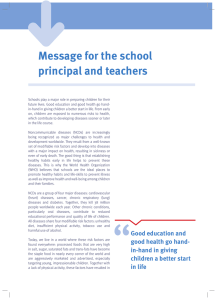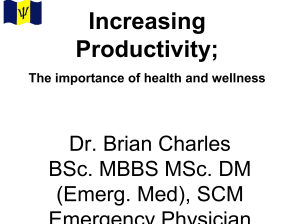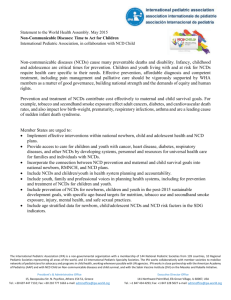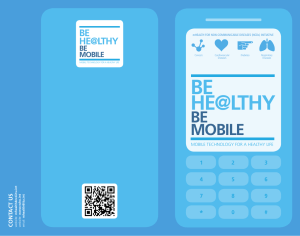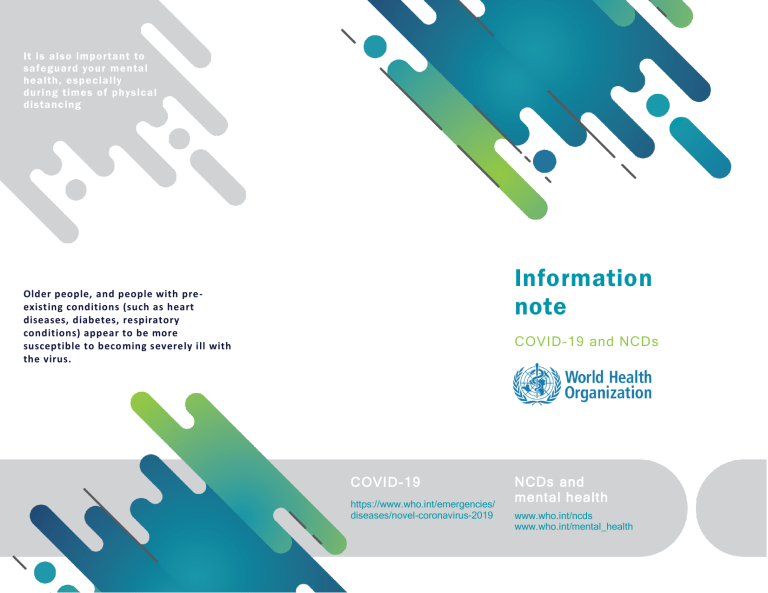
It is also important to safeguard your mental health, especially during times of physical distancing Information note Older people, and people with preexisting conditions (such as heart diseases, diabetes, respiratory conditions) appear to be more susceptible to becoming severely ill with the virus. COVID-19 and NCDs COVID-19 https://www.who.int/emergencies/ diseases/novel-coronavirus-2019 NCDs and mental health www.who.int/ncds www.who.int/mental_health COVID-19 and NCDs For people living with or affected by non-communicable diseases: People of all ages can be infected by the new coronavirus (COVID-19). The risk of becoming severely ill with the virus appears to increase if you are 60+. People with pre-existing non-communicable diseases (NCDs) also appear to be more vulnerable to becoming severely ill with the virus. These NCDs include: o Cardiovascular disease (e.g. hypertension, persons who have had, or are at risk for, a heart attack or stroke) o Chronic respiratory disease (e.g. COPD) o Diabetes o Cancer. Coronavirus disease (COVID-19) technical guidance: Patient management* – – Understand the patient’s co-morbid condition(s) to tailor the management of critical illness and appreciate the prognosis Communicate early with patient and family During intensive care management of COVID-19, determine which medications should be continued and which should be stopped temporarily. Communicate proactively with patients and families and provide support and prognostic information. Understand the patient’s values and preferences regarding life-sustaining interventions. * See https://www.who.int/publications-detail/clinical-management-of-severe-acute-respiratoryinfection-when-novel-coronavirus-(ncov)-infection-is-suspected COVID-19 and NCDs Risk factors and conditions that make people more vulnerable to becoming severely ill with COVID-19: Smokers are likely to be more vulnerable to COVID-19 as the act of smoking means that fingers (and possibly contaminated cigarettes) are in contact with lips which increases the possibility of transmission of virus from hand to mouth. Smokers may also already have lung disease or reduced lung capacity which would greatly increase risk of serious illness. Smoking products such as water pipes often involve the sharing of mouth pieces and hoses, which could facilitate the transmission of COVID-19 in communal and social settings. Conditions that increases oxygen needs or reduces the ability of the body to use it properly will put patients at higher risk of the consequences of bilateral viral pneumonia. A healthy lifestyle will make all bodily functions work better, including immunity. Eating healthy diets, with plenty of fruit and vegetables, keeping physically active, quitting smoking, limiting or avoiding alcohol intake, and getting enough sleep are key components of a healthy lifestyle. Tips for people living with or affected by NCDs: 1. Continue to take your medication and follow medical advice 2. Secure a one month supply of your medication or longer if possible 3. Keep a distance of at least one metre from people with a cough, cold or flu 4. Wash your hands often with soap and water 5. Quit smoking and avoid using coping strategies involving alcohol or drugs 6. Safeguard your mental health
